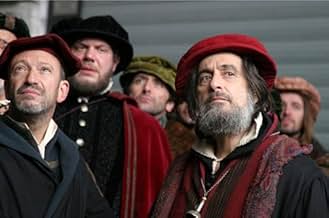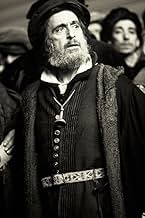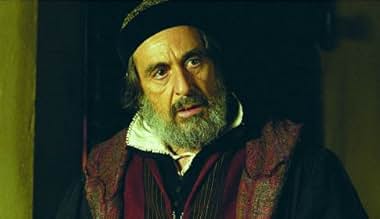En la Venecia del siglo XVI, cuando un comerciante debe dejar de pagar un gran préstamo a un prestamista judío maltratado por un amigo con ambiciones románticas, el acreedor, amargamente ven... Leer todoEn la Venecia del siglo XVI, cuando un comerciante debe dejar de pagar un gran préstamo a un prestamista judío maltratado por un amigo con ambiciones románticas, el acreedor, amargamente vengativo, exige un pago espantoso en su lugar.En la Venecia del siglo XVI, cuando un comerciante debe dejar de pagar un gran préstamo a un prestamista judío maltratado por un amigo con ambiciones románticas, el acreedor, amargamente vengativo, exige un pago espantoso en su lugar.
- Dirección
- Guión
- Reparto principal
- Nominado a 1 premio BAFTA
- 2 premios y 7 nominaciones en total
- Aragon
- (as Antonio Gil-Martinez)
Reseñas destacadas
The film deftly explores the themes of love vs loyalty, law vs justice, and passion vs reason. Some might protest that the content is inherently anti-semitic, however they should consider the historical context of the story, and the delicate and nuanced way in which it is told in this adaptation.
9/10
From the director of the film version of 1984, Michael Radford has created a masterpiece for everyone to enjoy time and time again.
With an outstanding cast that includes Al Pacino, (Shylock) Joseph Fiennes, (Bassanio) Jeremy Irons, (Antonio) Kris Marshall (Gratiano) and Lynn Collins, (Portia); this beautiful movie is a must see for every Shakespeare enthusiast.
The story is set in 15th century Britain when many Jews were sadly persecuted in the streets for no apparent reason. Bassanio with the help of Antonio visit a wealthy Jewish loan shark called Shylock and ask if they may borrow some money so Bassanio can visit his love, Portia. Shylock agrees but demands a pound of flesh from Antonio if he can not meet his strict payment demands.
A while later Antonio can not pay the loan and Shylock demands his pound of flesh. A ferocious court battle then takes place between the two men as Antonio's friends and family gather round to await his verdict.
This is a remarkable cinematic experience with the passionate Al Pacino at his best. Also look out for the rising young star, Kris Marshall from the hit, Love Actually. He played the part of Gratiano which such emotion and dignity.
This film, which will most certainly be up for Oscars, clearly demonstrates that Shakespeare can still entertain crowds centuries from his death.
Like so many of Shakespeare's great tragic heroes, Shylock continues to fascinate after 400 years because he is such a difficult and complex character. Pitiful, proud, angry, vengeful, weak, arrogant; his behaviour defies simply analysis and continues to be argued over. He is flawed not because he is a Jew, but because he is human. Rarely do modern screenwriters imbue their creations with such richly textured contradictions, and it is to everyone's benefit that we have Shakespeare to draw on for inspiration.
Shakespearean language is wild and rambling, saturated in multiple meanings, word play and metaphor. To be understood it must be wrangled and tamed by an actor with the strength and knowledge to do so. When an actor fails, the words pour forth in a torrent of incomprehensible words, but when he succeeds, the English language springs to life with an immediacy and vibrancy that takes your breath away. Al Pacino is one such actor, and here displays an incredible level of clarity and control that, were there any justice, would sweep every award in the offering. He meets the challenge of presenting Shylock head on, and delivers an extraordinarily subtle and nuanced performance. It would be a crime if we never got the opportunity to see what he does with King Lear.
The supporting cast is noteworthy. Jeremy Irons gives an original take on the familiar Antonio, presenting an older, quieter figure that displays the unsavoury contradictions between medieval chivalry and ugly prejudice of the time. Joseph Fiennes is a revelation as he matures beyond superficial eye-candy to actually inhabit a character for once. Lynn Collins is the only disappointment. Many of Shakespeare's women are underwritten and require an actor to really work hard to bring them to life, and Collins' Gwyneth Paltrow impersonation seems a little flat and unsuited to the darker tone that Radford is aiming for.
The design team must be acknowledged for creating a unique and thoroughly believable vision of Late Renaissance Venice. The city has not looked this ominous since 'Don't Look Now'. Taking full advantage of extant locations and natural light, the film has an appearance of authenticity that is greatly enhanced by the dark and timeworn costume design. All, again, are worthy of award recognition.
The financial backers of films such as this must be commended. With a budget of $30 million, they must go into such a venture in the full and certain knowledge that they will never make a profit, and yet they invest nonetheless. We can all be grateful for it, as the result is a remarkable adaptation that is sure to be a benchmark for many years to come.
The text is quite stripped down with many passages cut. But, I only noticed one line which was cut at the moment when I expected to hear it - and it was replaced by a look that said it all. This economy and judicious editing has given us a gripping movie - not just a film of the play.
And at last, there is a rationale as to why Antonio is so loyal and generous to the undeserving/unrelated Bassanio - you can almost feel Antonio's pulse start to race when he catches glimpse of Bassanio passing by in a gondola, or arriving for a visit. But it is as subtle as that - no more. I was spellbound.
There were many other highlights. I felt the arguments during the trial to be heartbreaking. And, the suitors' trials are hilarious.
Add all that to glorious cinematography and costumes that resonated with the times, and you'll understand why I can't wait to see it again. And again.
The movie does a great job of complicating the character of Shylock, and makes the viewer question his role as a victim or a villain. In the end, nobody will feel unmoved by the truly excellent and genuinely poignant court scene.
The courting prices are shallow stereotypes and constitute the only kind of (unintentional) humour this otherwise dry movie brings. I do not understand the choice of not giving the play-appropriated importance and weight in consequence to the casket-scenes. This is strange, since the movie is clearly a dramatized version of the play, and else there is not much that distinguishes Portia from a common harlot when every man can come make his suit without consequence. It saddens me to see the superficiality of these scenes, because Shakespeare did provide more complex and sympathetic characters in the original.
¿Sabías que...?
- CuriosidadesThe bare-breasted prostitutes were not put in the film to make it more risqué, but rather to add a note of historical authenticity. Venetian law at the time required all prostitutes to bare their breasts because the Christian authorities were concerned about rampant homosexuality in their city.
- PifiasIn Venice in 1598 a woman with no head-dress and her hair flowing loose would be taken for a whore, yet this is how Portia frequently appears.
- Citas
Shylock: I am a Jew! Hath not a Jew eyes? hath not a Jew hands, organs, dimensions, senses, affections, passions? Fed with the same food, hurt with the same weapons, subject to the same diseases, healed by the same means, warmed and cooled by the same winter and summer, as a Christian is? If you prick us, do we not bleed? if you tickle us, do we not laugh? if you poison us, do we not die? And if you wrong us, shall we not revenge? If we are like you in the rest, we will resemble you in that. If a Jew wrong a Christian, what is his humility? Revenge. If a Christian wrong a Jew, what should his sufferance be - by Christian example? Why, revenge. The villany you teach me, I will execute, and it shall go hard - but I will better the instruction.
- Créditos adicionalesPROLOGUE: "Intolerance of the Jews was a fact of 16th century life even in Venice, the most powerful and liberal city state in Europe."
"By law the Jews were forced to live in the old walled foundry or 'Geto' area of the city. After sundown the gate was locked and guarded by Christians."
"In the daytime any man leaving the ghetto had to wear a red hat to mark him as a Jew."
"The Jews were forbidden to own property. Thus, they practiced usury, the practice of lending money at interest. This was against Christian law."
"The sophisticated Venetians would turn a blind eye to it but for the religious fanatics, who hated the Jews, it was another matter . . . "
- ConexionesFeatured in 'Merchant of Venice': Shakespeare Through the Lens (2005)
- Banda sonoraWith Wand'ring Steps
Composed by Jocelyn Pook, Lyrics by John Milton
Arranged by Jocelyn Pook
Performed by Baroque Strings Quartet Ensemble, featuring solo vocals by Andreas Scholl
Harp: Siobhan Armstrong
Psaltery: Harvey Brough
Lute: Elizabeth Kenny
Published by Shylock Ltd / EMI Music Publishing Ltd
© 2004 Decca Music Group Limited
(p) Jocelyn Pook Ltd. /2004 Decca Music Group Limited
Selecciones populares
Detalles
- Fecha de lanzamiento
- Países de origen
- Sitios oficiales
- Idiomas
- Títulos en diferentes países
- El mercader de Venècia
- Localizaciones del rodaje
- Esch-sur-Alzette, Luxemburgo(only Venice film set)
- Empresas productoras
- Ver más compañías en los créditos en IMDbPro
Taquilla
- Presupuesto
- 30.000.000 US$ (estimación)
- Recaudación en Estados Unidos y Canadá
- 3.765.585 US$
- Fin de semana de estreno en EE. UU. y Canadá
- 69.868 US$
- 2 ene 2005
- Recaudación en todo el mundo
- 21.560.182 US$
- Duración2 horas 11 minutos
- Color
- Mezcla de sonido
- Relación de aspecto
- 2.35 : 1










































